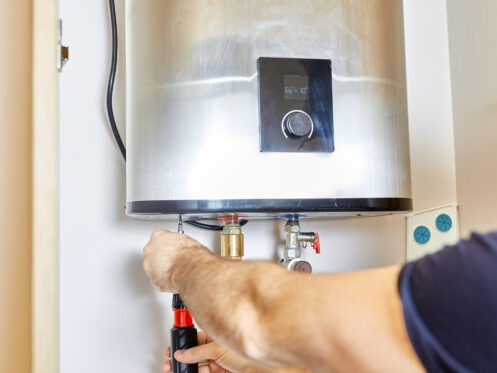Replacing a water heater is an inevitable part of home ownership. Most homeowners want to get the longest possible service life out of their home’s water heater. Here is a look at how you can extend the time that your water heater serves your household.
Get the Installation Right
When you initially purchase a water heater, invest in getting the installation right. A quality installation should help you avoid costly repairs. Our plumbers follow the manufacturer’s installation guidelines to ensure safety, effectiveness and efficiency.
Note that your water heater’s size directly impacts its effectiveness and lifespan. A unit that’s too small will work overtime to meet your household’s demands, potentially shortening its service life. Conversely, an oversized system wastes energy. You may also want to look at installing a tankless water heater when the time for a replacement comes. A tankless system eliminates the need to store water and repeatedly reheat it.
The installation location of a gas system needs proper ventilation to prevent dangerous gas buildup and maintain optimal operating conditions. For gas water heaters, this means ensuring the vent pipe remains unobstructed and properly sealed. Securely anchoring the water heater protects it from potentially damaging movements, such as when someone might bump against it. Also, you should position the unit with future maintenance in mind, leaving enough space for easy access to components. Thoughtful placement makes routine maintenance simpler, encouraging regular service and extending the system’s life.
Water Quality
Water quality is essential to a water heater’s longevity, with hard water posing one of the biggest threats to the system’s performance and service life. Hard water contains high levels of calcium and magnesium that create scale buildup inside the tank. This scale forms an insulating layer on heating elements and tank walls, forcing your water heater to work harder and consume more energy.
Beyond hard water concerns, high levels of chlorine and other disinfectants in municipal water supplies can accelerate corrosion inside your tank. These chemicals, while necessary for safe drinking water, can break down your tank’s protective inner lining and damage the anode rod that shields your tank from rust. Some areas also have naturally occurring minerals like iron and manganese that create sediment buildup in your tank.
Installing a whole-house water filtration system is the simplest and broadest solution. Filters remove harmful chemicals, sediment and excess minerals before water ever enters the water heater. For hard water specifically, a water softener can prevent scale formation by removing calcium and magnesium through an ion exchange process.
Draining and flushing a water heater will also hold back scaling. The process gets residual calcium, magnesium and chlorine out of the system. It also ensures that fresh water circulates in the system with lower concentrations of minerals and chemicals that encourage scaling. The requirements for draining and flushing a water heater vary by manufacturer, so check the manual to see how often both are necessary.
Routine Maintenance
Routine maintenance is your water heater’s best defense against expensive repairs and potential early failure. In the same way a car needs regular service, your water heater needs consistent care to perform at its best and achieve its maximum lifespan. A well-maintained water heater can last several years beyond its expected service life, meaning you’ll accrue significant savings. In addition to draining and flushing the water heater, here are some other maintenance tasks.
The temperature and pressure relief valve plays a crucial role in your water heater’s safety system. During checkups, our plumbers test this valve annually by lifting and lowering its handle so that they can listen for the proper release of water into the drain tube.
Your water heater’s anode rod protects the tank from corrosion, acting as a sacrificial component that wears out instead of your tank. Check this rod every six months and replace it when it shows significant deterioration. A good metric that the anode rode is due for replacement is when more than 6 inches of the core wire is exposed. Timely replacement of the anode rod can double your water heater’s lifespan by preventing rust and leaks.
Homeowners should also check the area around the water heater for signs of trouble every three months. Look for water stains around pipe connections, listen for unusual sounds and monitor your water heater’s performance. Check the area around your unit for moisture, rust or white mineral deposits that might indicate a developing leak. Generally, the sooner you catch these problems the more cost-effective the solution will be.
Track your routine maintenance schedule, too. Keep a written log with dates and notes. If you’re too busy to track the schedule, our company would be happy to set up a recurring calendar of appointments.
Improve the Water Heater’s Energy Efficiency
Energy efficiency affects more than just your utility bills. Efficiency also directly influences your water heater’s lifespan. Running your water heater at unnecessarily high temperatures forces it to work harder, accelerating wear on the heating element and other critical components. Even if you catch the problem with regular checkups, you will incur additional costs keeping up with the maintenance work.
Setting the water heater’s temperature to 120 degrees Fahrenheit strikes an ideal balance between comfort and efficiency. This temperature provides plenty of hot water for most household needs while preventing scalding risks and reducing energy consumption. Every 10 degrees you lower the temperature should cut your energy costs roughly by 3%-5% while extending the water heater’s life.
Installing water-efficient fixtures throughout your home reduces demands on your water heater, too. Low-flow showerheads and faucet aerators can cut hot water usage by up to 60% without sacrificing water pressure. Modern high-efficiency dishwashers use dramatically less hot water than hand-washing dishes, reducing the workload on both you and the water heater.
Insulating hot water pipes and the water heater itself will also prevent heat loss. A well-insulated system reduces how often the unit needs to reheat water. In addition to lengthening the service life of your home’s water heater, insulation also will cut your monthly energy bills.
Replace and Upgrade
As much as you may want to get the most out of a water heater, the time will come to replace it. Take the opportunity to upgrade to a more efficient model that’s sized properly for your household. Replacing the water heater sooner ensures that you won’t have to deal with a major leak, too.
You should budget for an eventual replacement. Factors like system design, water quality, usage and simple luck will cause some variance in the service life of a water heater. Typically, gas water heaters should provide at least 10 years of service, electric water heaters will last a few years longer and tankless systems last at least 20 years.
Air Control Home Services takes on a variety of plumbing jobs for the people of Lake Havasu City, Mohave County and the surrounding areas. We perform installations, repairs, upgrades and maintenance on a wide variety of systems. If you want to get the most out of your home’s water heater, contact us today for a consultation.






